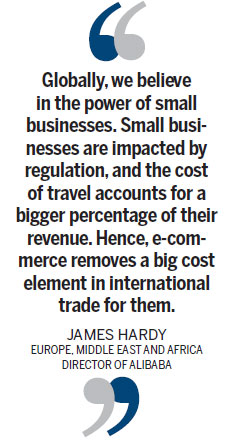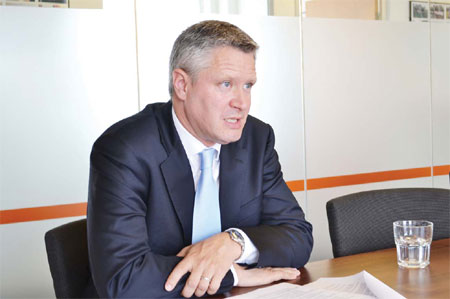Small strides, big gains
Updated: 2013-08-16 09:00
By Cecily Liu and Qiu Bo (China Daily)
|
|||||||||||
|
James Hardy, Europe, Middle East and Africa director of Alibaba, says that speed and quality services are what set Chinese e-commerce firms apart in Europe. Provided to China Daily |

Struggling European SMEs bank on Chinese e-commerce platforms to stay afloat
Trust and value-added services have been the mainstay of Alibaba's success in China, but this has not deterred it from expanding aggressively in overseas markets like Europe.
The e-commerce giant, which deals with business-to-business online marketplaces, retail and payment platforms, shopping search engines and data-centric cloud computing services, is banking on connecting the struggling small and medium-sized businesses in Europe with the huge domestic market in China.
James Hardy, Europe, Middle East and Africa director of Alibaba, feels that the group will become an increasingly global platform in the future. "E-commerce reduces the physical boundaries between markets. Customer bases are also experiencing a shift to become more international," he says.
"There is now a growing trend toward globalization, where particular products are increasingly made in specific areas that have a comparative advantage in making them. E-commerce will help these geographies maintain their comparative advantages and create a large eco-system," he says.
However, for Chinese e-commerce firms it will be the speed and quality of services that will be the game-changer in Europe.
"Speedy and proactive responses to customer needs is what sets Chinese e-commerce firms apart in Europe," he says.
"There's an expectation and enthusiasm (at Alibaba) that if the market has changed in any way, to immediately change course. It is done fast and by everyone in the team smoothly," Hardy says.
Alibaba has more than 7.2 million registered members in Europe, including more than 1.6 million in the UK, 420,000 in Germany and 495,000 in France.
To provide its customers with quality assurances, Alibaba undertakes thorough scrutiny of its suppliers and their antecedents. It also provides Escrow, a service that enables withholding payment from suppliers until the goods are delivered.
The company's UK office mainly focuses on expanding the customer base in Europe through trade fairs, publicity events and online campaigns. It also gathers feedback from UK and European users of the platform for its headquarters.
"We are pleased to see that a lot of the feedback is adapted, and very quickly too. It is certainly within weeks, rather than months," Hardy says, adding that most of the responses pertain to suggestions on services and products that the company could add.
Citing an example, Hardy says AliSourcePro is one such product. It allows buyers to post inquiries on the Alibaba portal about the product they wish to buy, which in turn will be made available to potential suppliers, who can then reply to the buyer's request.
This product saves customers from doing the work of sifting through lots of supplier information to select details relevant to them, says Hardy adding it is designed and refined through feedback that his team and Alibaba's US team give to the head office.
To recruit more customers, Hardy's team frequently attends trade fairs across Europe, including Equip Auto in France, eCommerce Expo in the UK, and the electronics show IFA in Germany.
At these fairs, Hardy's team answers questions from buyers and suppliers about how to effectively use Alibaba's online portal for effective searches, how to use different search functions, and also gives advice on how to find the best suppliers, ensure safety in the trading process and select countries that are the most effective in supplying certain products.
He says that these trade fairs are good opportunities to gather feedback from customers, and raise Alibaba's brand awareness. He says typically these shows can attract about 60,000 to 70,000 visitors.
Hardy says Alibaba's key customers in Europe are small and medium-sized businesses, because a lot of them rely on e-commerce for international trade, as they do not have the budget to physically manage international sales themselves.
"Globally, we believe in the power of small businesses. Small businesses are impacted by regulation, and the cost of travel accounts for a bigger percentage of their revenue. Hence, e-commerce removes a big cost element in international trade for them," Hardy says.
"E-commerce also makes the playing field a lot more level, and the growth of e-commerce is a key reason for the growth in the number of SMEs globally," he says.
In the UK, for example, SMEs accounted for 59 percent of private sector employment and 49 percent of total business turnover in 2011, according to government statistics.
According to European Commission statistics, more than 99 percent of all businesses in Europe are SMEs, defined as having employment numbers of no more than 250, and turnover of no more than 50 million euros.
Despite being an important part of Europe's economy, SMEs have been hit hard by Europe's current economic downturn, Hardy says. He says this is mainly due to a drop in consumer demand across all sectors, and increased difficulty in getting financing.
Hardy says that Europe's SMEs should embrace e-commerce and look more toward markets further away, like China and India, as opposed to staying in their comfort zone where they have a long history of trading.
"There is a mismatch between where Europe's SMEs think the opportunities are, and where the opportunities actually are. We try to ensure SMEs understand where the opportunities come from," Hardy says.
For UK products, for example, the top destinations Alibaba received buyer inquiries from were the UK itself, the US, China, India and France.
Hardy says this contradicts SMEs' expectations because most of the UK SMEs look to Europe for opportunities where free trade agreements mean SMEs do not need to pay tariffs to trade with each other.
"Our data shows what economists call pure demand, which is literally the number of inquires we receive from particular markets. Sometimes business opportunities can lie outside the free trade zones because tariffs and regulations can keep competitors away too," he says.
In recent months, Hardy's team has taken on the new challenge of promoting Tmall.com, a business-to-consumer platform that is part of the Alibaba group. Through this platform, Western suppliers like Marks & Spencer and Mothercare can set up an online storefront to try and reach individual Chinese consumers.
He says although brands like Marks & Spencer and Mothercare have the capability to set up their own physical and online stores in China, Tmall gives them greater consumer traffic and publicity.
"The majority of online shopping in China takes place in marketplaces, as opposed to individual stores, which means Tmall exposes sellers to more customers. Tmall would also allow sellers to do analysis about who's buying and, why they're buying, which is research that individual sellers would find hard to do," Hardy says.
He says the Japanese apparel retailer Uniqlo, for example, has an e-commerce website in China, but customers wishing to make orders would see their requests directed to Uniqlo's store on Tmall, which demonstrates the value of the back-end analytics that Tmall offers.
Contact the writers at cecily.liu@chinadaily.com.cn and qiubo@chinadaily.com.cn
(China Daily European Weekly 08/16/2013 page8)
Today's Top News
List of approved GM food clarified
ID checks for express deliveries in Guangdong
Govt to expand elderly care
University asks freshmen to sign suicide disclaimer
Tibet gears up for new climbing season
Media asked to promote Sino-Indian ties
Shots fired at Washington Navy Yard
Minimum growth rate set at 7%
Hot Topics
Lunar probe , China growth forecasts, Emission rules get tougher, China seen through 'colored lens', International board,
Editor's Picks

|

|

|

|

|

|






